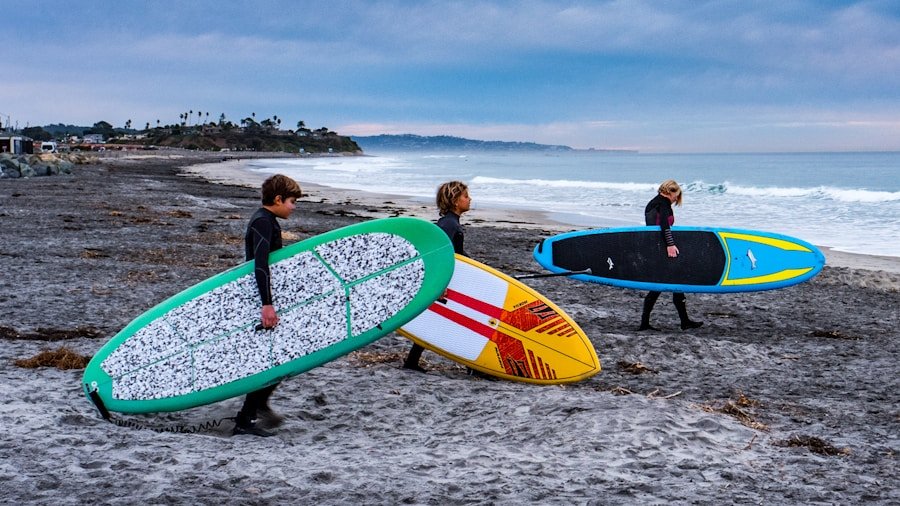When it comes to eco-friendly camping, choosing the right campsite is crucial in minimizing your environmental impact. Look for campsites that are designated as “Leave No Trace” areas, which means they are committed to preserving the natural environment and minimizing human impact. These campsites often have designated areas for camping, hiking, and other activities to prevent damage to the surrounding ecosystem.
Additionally, consider camping in areas that are already heavily used, as this can help minimize the impact on the environment by concentrating human activity in one area rather than spreading it out over multiple locations. Another important factor to consider when choosing a campsite is its proximity to water sources. Camping near water sources can lead to contamination and erosion, so it’s best to choose a campsite that is at least 200 feet away from any water source.
This will help protect the water quality and prevent damage to the surrounding ecosystem. Additionally, look for campsites that have designated fire pits and cooking areas to minimize the impact on the natural landscape.
Key Takeaways
- Choose a campsite that is designated for camping and follow all rules and regulations to minimize impact on the environment
- Use sustainable camping gear and supplies such as reusable utensils, biodegradable soap, and solar-powered lanterns
- Follow Leave No Trace principles by packing out all trash, minimizing campfire impact, and respecting wildlife
- Practice waste management and recycling by properly disposing of all waste and recycling materials when possible
- Plan eco-friendly meals by using local and organic ingredients, minimizing packaging, and packing out all food waste
Sustainable Camping Gear and Supplies
Investing in sustainable camping gear and supplies is another important aspect of eco-friendly camping. Look for gear and supplies that are made from environmentally friendly materials, such as recycled or biodegradable materials. This can include items such as tents, sleeping bags, and cooking utensils made from sustainable materials.
Additionally, consider investing in gear that is designed to last, as this can help reduce waste and minimize the need for frequent replacements. When it comes to camping supplies, opt for reusable items whenever possible. This can include items such as reusable water bottles, food containers, and utensils.
By using reusable items, you can minimize the amount of waste generated during your camping trip and reduce your environmental impact. Additionally, consider packing eco-friendly cleaning supplies, such as biodegradable soap and reusable cleaning cloths, to minimize the use of single-use plastic products.
Leave No Trace Principles
Adhering to the Leave No Trace principles is essential for minimizing your environmental impact while camping. These principles include guidelines for minimizing campfire impacts, respecting wildlife, and disposing of waste properly. When building a campfire, use existing fire rings whenever possible and keep the fire small to minimize the impact on the surrounding landscape.
Additionally, be mindful of wildlife and avoid feeding or approaching animals to prevent disruption to their natural behaviors. Proper waste disposal is also a key aspect of Leave No Trace principles. Pack out all trash and waste from your campsite and dispose of it properly in designated receptacles.
This includes items such as food scraps, packaging materials, and personal hygiene products. By following these principles, you can help preserve the natural beauty of the camping area and minimize your environmental impact.
Waste Management and Recycling
| Tip | Description |
|---|---|
| Choose a sustainable campsite | Look for campsites that have eco-friendly practices, such as recycling programs and energy-efficient facilities. |
| Use reusable camping gear | Opt for reusable items like water bottles, utensils, and food containers to minimize waste. |
| Minimize campfire impact | Follow Leave No Trace principles and use existing fire rings to minimize the impact on the environment. |
| Dispose of waste properly | Pack out all trash and dispose of it in designated receptacles to keep the campsite clean. |
| Conserve water | Use water sparingly and avoid contaminating natural water sources with soap or waste. |
Effective waste management and recycling are essential for eco-friendly camping. Before heading out on your camping trip, plan ahead by packing items with minimal packaging and avoiding single-use products whenever possible. This can help reduce the amount of waste generated during your trip and minimize your environmental impact.
Additionally, be sure to pack plenty of trash bags and recycling containers to properly dispose of waste and recyclable materials. When it comes to waste management at the campsite, be sure to separate recyclable materials from non-recyclable waste. This can include items such as plastic bottles, aluminum cans, and glass containers.
By separating recyclable materials from non-recyclable waste, you can help reduce the amount of waste that ends up in landfills and minimize your environmental impact. Additionally, consider composting food scraps and organic waste to further reduce the amount of waste generated during your camping trip.
Eco-Friendly Cooking and Meal Planning
Eco-friendly cooking and meal planning are important aspects of minimizing your environmental impact while camping. When planning meals for your camping trip, opt for locally sourced and sustainable ingredients whenever possible. This can include items such as fruits and vegetables from local farmers markets, sustainably caught seafood, and organic meats.
By choosing locally sourced and sustainable ingredients, you can support local businesses and reduce the environmental impact of your meals. When it comes to cooking at the campsite, opt for eco-friendly cooking methods such as using a camp stove or portable grill instead of a traditional campfire. This can help minimize the impact on the surrounding landscape and reduce air pollution.
Additionally, be mindful of portion sizes and avoid over-purchasing food items to minimize food waste. By planning meals carefully and using eco-friendly cooking methods, you can reduce your environmental impact while camping.
Conserving Water and Energy
Conserving water and energy is crucial for eco-friendly camping. When camping in natural areas, it’s important to minimize water usage to prevent damage to the surrounding ecosystem. This can include simple actions such as taking shorter showers, turning off faucets when not in use, and using water-saving devices such as low-flow showerheads.
Additionally, be sure to pack biodegradable soap and shampoo to minimize the impact on water quality. When it comes to conserving energy at the campsite, opt for energy-efficient lighting options such as solar-powered lanterns or LED flashlights. These options can help reduce energy consumption and minimize your environmental impact.
Additionally, be mindful of energy usage when charging electronic devices by using portable solar chargers or power banks instead of relying on traditional power sources.
Supporting Local and Sustainable Businesses
Supporting local and sustainable businesses is another important aspect of eco-friendly camping. When purchasing supplies for your camping trip, opt for items from local businesses whenever possible. This can include items such as food, gear, and supplies that are locally sourced or produced.
By supporting local businesses, you can help reduce the environmental impact of your camping trip by minimizing transportation emissions and supporting sustainable practices. Additionally, look for businesses that are committed to sustainability and environmental stewardship. This can include businesses that prioritize eco-friendly practices such as recycling, energy conservation, and waste reduction.
By supporting these businesses, you can help promote sustainable practices within the camping industry and minimize your environmental impact while enjoying the great outdoors. In conclusion, eco-friendly camping is all about minimizing your environmental impact while enjoying the natural beauty of the outdoors. By choosing the right campsite, investing in sustainable gear and supplies, adhering to Leave No Trace principles, effectively managing waste and recycling, planning eco-friendly meals, conserving water and energy, and supporting local businesses, you can make a positive impact on the environment while enjoying your camping trip.
With careful planning and mindful practices, you can enjoy a sustainable and eco-friendly camping experience that minimizes your environmental footprint and helps preserve the natural beauty of our planet for future generations to enjoy.
FAQs
What is eco-friendly camping?
Eco-friendly camping refers to the practice of minimizing the environmental impact while enjoying outdoor activities such as camping. This includes reducing waste, conserving resources, and respecting the natural surroundings.
What are some tips for eco-friendly camping?
Some tips for eco-friendly camping include using reusable or biodegradable camping gear, minimizing waste by packing out trash, using eco-friendly toiletries, and choosing a campsite that has minimal impact on the environment.
How can I minimize my environmental impact while camping?
You can minimize your environmental impact while camping by practicing Leave No Trace principles, using energy-efficient camping equipment, conserving water, and being mindful of wildlife and natural habitats.
Why is eco-friendly camping important?
Eco-friendly camping is important because it helps preserve natural environments, reduces pollution, and minimizes the negative impact of outdoor recreation on ecosystems. It also promotes sustainable and responsible outdoor practices.













